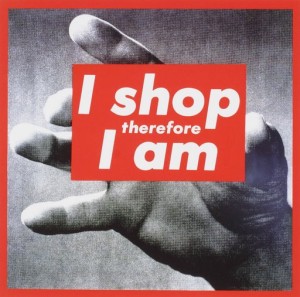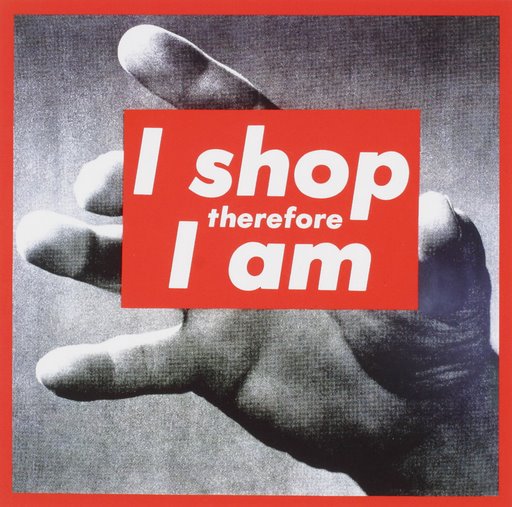“The first stage of the economy’s domination of social life brought about an evident degradation of being into having – human fulfillment was no longer equated with what one was, but with what one possessed. The present stage, in which social life has become completely dominated by the accumulated productions of the economy, is bringing about a general shift from having to appearing… At the same time all individual reality has become social, in the sense that it is shaped by social forces and is directly dependent on them.” [1]

Barbara Kruger, Untitled (I shop therefore I am), 1987
In his seminar on The Four Fundamental Concepts of Psycho-Analysis, Jacques Lacan exposits a conception of the social unconscious which recognized that a person’s identity is socially constructed within the context of their community.[2] For Lacan, the process of self-definition is not an autonomous enterprise. Instead, identity is intersubjective; subject to the pressures and beliefs of the broader community, and these corporate and implicit influences can be understood to comprise the “social unconscious.” It is “social” because it is determined through societal interaction, and it is “unconscious” because it is so pervasive that it often manifests its will through the members of a given community undetected.
As consumers in an increasingly commodified culture, the will of the social unconscious is often manifested in the marketplace. As Naomi Klein explained in her seminal book, No Logo, contemporary advertising is primarily concerned with developing and disseminating the meanings of brands. These meanings often aspire to be spiritual. [3] When advertising is successful, these commercial narratives become part of the social unconscious and come to bear on decisions we may think are autonomous. For example, when I purchased the Apple iPad I am using to compose this post, I did so based on a combination of thoughts and feelings that Apple wanted me to associate their product. In so doing, I essentially acquiesced to the will of the social unconscious insofar as Apple’s desire for me as a consumer preceded my desire for the iPad as a product. This begs the question – who is consuming whom?
Few artists have been more adept at illuminating the social unconscious of contemporary consumer culture than Barbara Kruger. In her photographic silkscreen, Untitled (I shop therefore I am), Kruger deftly employs her trademark appropriation of commercial forms to subvert and expose the presuppositions implicit in consumer society regarding assertions of identity. By reframing the Cartesian dictum, “I think, therefore I am,” Kruger confronts us with the unsettling proposition that in today’s marketplace, even identity can be reduced to a commodity to be bought, sold, exchanged and upgraded – or at least it appears we believe that it can.
In light of these considerations, I’ve decided to review my credit card statements in order to construct a consumerist autobiography based on the meanings I’ve associated with the brands and products I’ve purchased over the last ten years. It begins like this:
My name is Christopher. In undergrad I was a PC…
Christopher Min has a background in arts administration and entertainment, most recently serving as a segment and live events producer for MTV Networks. He is currently pursuing a degree in Theology and the Arts at Fuller Theological Seminary in Southern California.
[1] Guy Debord, The Society of the Spectacle, trans. Ken Knabb (London: Rebel Press, 2006) 10.
[2] Jacques Lacan, The Four Fundamental Concepts of Psycho-Analysis, ed. Jacques-Alain Miller, trans. Alan Sheridan (New York: Norton, 1978) 235.
[3] Naomi Klein, No Logo, (New York: Picador, 2002), 21.




Thank you sharing this artwork and these ideas. Wendell Berry writes in his essay on Economy and Sex and Community (something like that) about two economies, one that of buying and selling and another of giving and receiving. He said it is the latter that has been lost and must be recovered lest we lose our humanity. Marriage and sexuality belong to the latter economy.
So, this leads me to wonder how much our social networks are an attempt to put forth the image management of which you speak. Are we now attempting to do in our personal lives what has always taken place with resumes…that is, padding? This seems the natural implication of viewing our sense of self as a brand.
I think you’re on to something, Dave. Naomi Klein wrote that “image is equity” and I think we have come to understand this implicitly due to the ubiquity of advertising in so many spheres of our lives. If advertising is a language in which we have all become fluent, it makes sense that we would begin to appropriate that language to disseminate meanings about ourselves, especially through outlets such as social media. I think, perhaps, we are witnessing a sort of feedback loop. Brands appropriated spiritual and emotional meanings in order to provoke us to consume, and we in turn have appropriated the tools of advertising in order to communicate spiritual and emotional meanings about us. Wasn’t it McLuhan who said we shape our tools, and thereafter our tools shape us?
Thanks Jason,
It would be interesting to put Berry’s thoughts on the economy of marriage and sexuality in dialogue with Lacan’s writings on the social unconscious. Lacan holds that even our desires for another person are subject to what we believe that person represents socially and symbolically. According to Lacan, we don’t just desire or want another person because of who they actually are, but also because of what they represent to the broader social unconscious. Our desire for another, according to Lacan, is not purely for the individual in their uniqueness, but for what they signify for us in terms of place in the social order and social status. So to some degree, we value and desire whom the social unconscious tells us to. How might Berry’s Christian conception of the economy of marriage and sexuality come to bear on the conversation? Very interesting indeed.